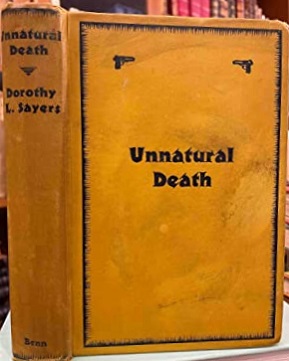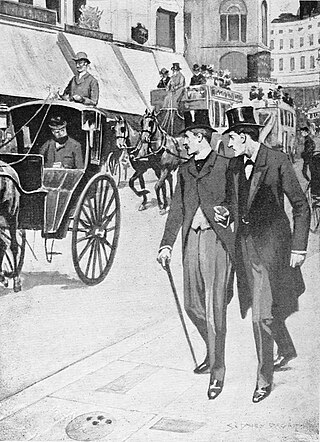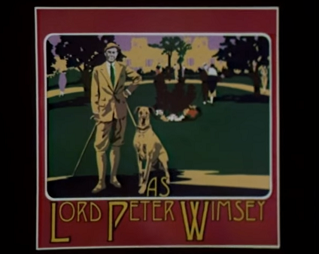Related Research Articles
Gaudy Night (1935) is a mystery novel by Dorothy L. Sayers, the tenth featuring Lord Peter Wimsey, and the third including Harriet Vane.

Lord Peter Death Bredon Wimsey is the fictional protagonist in a series of detective novels and short stories by Dorothy L. Sayers. A dilettante who solves mysteries for his own amusement, Wimsey is an archetype for the British gentleman detective. He is often assisted by his valet and former batman, Mervyn Bunter; by his good friend and later brother-in-law, police detective Charles Parker; and, in a few books, by Harriet Vane, who becomes his wife.

Murder Must Advertise is a 1933 mystery novel by Dorothy L. Sayers, the eighth in her series featuring Lord Peter Wimsey. Most of the action of the novel takes place in an advertising agency, a setting with which Sayers was familiar as she had herself worked as an advertising copywriter until 1931.

Unnatural Death is a 1927 mystery novel by Dorothy L. Sayers, her third featuring Lord Peter Wimsey. It was published under the title The Dawson Pedigree in the United States in 1928.
The Nine Tailors is a 1934 mystery novel by the British writer Dorothy L. Sayers, her ninth featuring Lord Peter Wimsey. The story is set in the Lincolnshire Fens, and revolves around a group of bell-ringers at the local parish church. The book has been described as Sayers' finest literary achievement, although not all critics were convinced by the mode of death, nor by the amount of technical campanology detail included.
Busman's Honeymoon is a 1937 novel by Dorothy L. Sayers, her eleventh and last featuring Lord Peter Wimsey, and her fourth and last to feature Harriet Vane.
Thrones, Dominations is a Lord Peter Wimsey–Harriet Vane murder mystery novel that Dorothy L. Sayers began writing but abandoned, and which remained at her death as fragments and notes. It was completed by Jill Paton Walsh and published in 1998. The title is a quotation from John Milton's Paradise Lost and refers to two categories of angel in the Christian angelic hierarchy.
Hangman's Holiday is a collection of short stories, mostly murder mysteries, by Dorothy L. Sayers. This collection, the ninth in the Lord Peter Wimsey series, was first published by Gollancz in 1933, and has been reprinted a number of times since, for example the 1995 paperback: ISBN 978-0-06-104362-8).
In the Teeth of the Evidence is a collection of short stories by Dorothy L. Sayers first published by Victor Gollancz in 1939. The book's title is taken from the first story in the collection.
Lord Peter is a collection of short stories featuring Lord Peter Wimsey. First published in 1972 (ISBN 0-380-01694-X), it includes all the short stories about Lord Peter written by Dorothy L. Sayers, most of which were published elsewhere soon after they were written, and some related writings.
Harriet Deborah Vane, later Lady Peter Wimsey, is a fictional character in the works of British writer Dorothy L. Sayers (1893–1957) and the sequels by Jill Paton Walsh.
Mervyn Bunter is a fictional character in Dorothy L. Sayers's novels and short stories. He serves as Lord Peter Wimsey's valet, and served as Wimsey's batman during the First World War. Bunter was partially based on the fictional butler Jeeves, created by P. G. Wodehouse.
"The Image in the Mirror" is a short story by Dorothy L. Sayers, featuring Lord Peter Wimsey and published as the first story in Hangman's Holiday in 1933.
In the works of Dorothy L. Sayers, the fictional title of Duke of Denver is held by Gerald Wimsey, older brother of the books' protagonist, Lord Peter Wimsey. In novels written after Sayers' death by Jill Paton Walsh, Lord Peter also eventually holds the title. Sayers and several friends constructed an elaborate backstory for the duchy.
Sergeant/Inspector/Chief Inspector Charles Parker is a fictional police detective who appears in several Lord Peter Wimsey stories by Dorothy L. Sayers, and later becomes Lord Peter's brother-in-law.

Striding Folly is a collection of short stories by Dorothy L. Sayers featuring Lord Peter Wimsey. First published in 1972, it contains the final three Lord Peter stories. The first two, "Striding Folly" and "The Haunted Policeman", were previously published in Detection Medley (1939), an anthology of detective stories. The third one, "Talboys", was unpublished. All three stories were also anthologized by James Sandoe in the collection Lord Peter: A Collection of All the Lord Peter Wimsey Stories.

The amateur detective, or sometimes gentleman detective, is a type of fictional character. He has long been a staple of crime fiction, particularly in detective novels and short stories set in the United Kingdom in the Golden Age. The heroes of these adventures are often members of the British gentry or gentlemen by conduct. They are sometimes contrasted with professional police force detectives from the working classes.

Dorothy Leigh Sayers was an English crime novelist, playwright, translator and critic.
Miss Katharine Alexandra Climpson is a minor character in the Lord Peter Wimsey stories by Dorothy L. Sayers. She appears in two novels: Unnatural Death (1927) and Strong Poison (1930), and is mentioned in Gaudy Night (1935) and Busman's Honeymoon (1937).

Lord Peter Wimsey is a series of television serial adaptations of five Lord Peter Wimsey novels by Dorothy L. Sayers, starring Ian Carmichael as Wimsey. They were broadcast on BBC1 between 1972 and 1975, beginning with Clouds of Witness in April 1972.
References
- ↑ "Sayers, Dorothy L.". Britannica Biographies. 2012.
Sayers wrote short stories that featured not only Lord Peter but also another detective creation, Montague Egg.
- ↑ "Sayers". Merriam-Webster's Encyclopedia of Literature. Vol. S. 1995.
Both Lord Peter and another of Sayers' creations, Montague Egg, are featured in short stories.
- ↑ Murders of the Month. (1933). TIME Magazine, 22(14), 52. "HANGMAN'S HOLIDAY—Dorothy L. Sayers—Harcourt, Brace ($2). A dozen stories, some about Lord Peter Wimsey; some about Montague Egg, traveling salesman full of apt saws; some about neither."